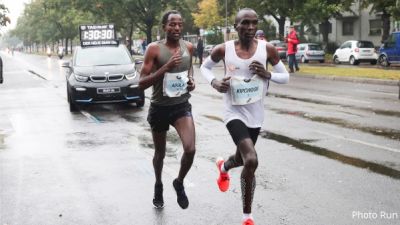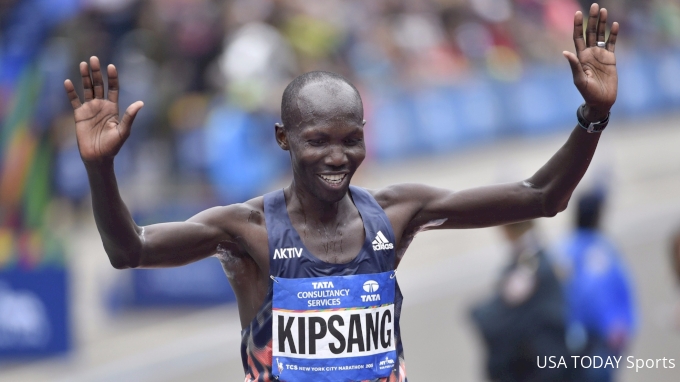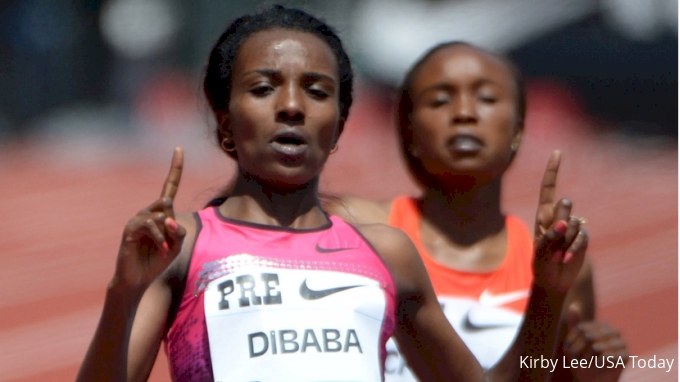3 Big Questions At The Berlin Marathon
3 Big Questions At The Berlin Marathon
Eliud Kipchoge looks to add to his legacy with a world record at Sunday's Berlin Marathon.

The recently completed track season was defined by new stars--emergent talents like Noah Lyles and Sydney McLaughlin who will shape the next Olympic cycle. But it's a bit different in the marathon, where the fall season centers around the establishment.
In Chicago, former training partners Mo Farah and Galen Rupp will meet for the first time at the distance. A month later in New York, the U.S. trio of Molly Huddle, Desiree Linden, and Shalane Flanagan will try to extend the American women’s marathon magic. And in Berlin, Eliud Kipchoge looks to extend the most impressive streak in the event while chasing the world record.
Watch the 2018 Berlin Marathon LIVE in select countries
The question of the world record hangs over Kipchoge every time he takes the line--a reality born out of his proximity to Dennis Kimetto’s 2:02:57 and the fact there’s virtually nothing left for Kipchoge to accomplish in the event. Another gold medal at the Olympics or a win at New York or Boston is icing on a cake that's already 30 feet tall.
Still, there is a power in a world record.
He has no equals among his contemporaries, but when Kipchoge’s career is reviewed in 15 or 20 years, a personal best of 2:02:56 will carry a disproportionate amount of weight over staying at his current best of 2:03:05.
The question of the world record is just one of several questions to track on Sunday morning.
Can Eliud Kipchoge Break The World Record?
Kipchoge enters the race as the heavy favorite. He’s won eight marathons in a row (nine if you count the Breaking 2 marathon, where he ran 2:00:25) and hasn’t lost a marathon since Berlin in 2013. His lifetime best of 2:03:05 makes the world record an obvious question, but it also gets floated because he has dominated his competitors so thoroughly for five years--an unheard of streak in modern marathoning.
The weather forecast, as of this writing, looks conducive to fast times: moderate temperatures, and it doesn’t appear that there will be buckets of rain like last year, when he ran 2:03:32.
If the weather cooperates, the other parts of the equation are pacing and competition. Rabbits in Berlin have been much more consistent than in other marathons. Whatever pace Kipchoge wants, they should be able to accommodate through at least 25K.
Once the pacers step off, there’s a good chance that Kipchoge is alone. If he’s running world record pace, there doesn’t look to be anybody in this field that could stay with him (more on his competition below), but could someone like Wilson Kipsang at least give Kipchoge a push while running under 2:03:00 pace?
Again, it seems unlikely.
But Kipchoge breaking the world record running alone for the last nine miles wouldn’t be the most ridiculous feat of his career. He’s had plenty of lonely miles, and if the outcome of the race is decided, he can shift his focus entirely to 2:02:56.
Is There A Guye Adola In The Field This Year?
Last year, Guye Adola did what few men have done--maintain a lead against Eliud Kipchoge in the in the final mile of a marathon. Adola was in his debut race in the distance, and came close to stumbling into one of the biggest upsets in marathon history. Kipchoge, as he does, kept his composure over the late race surge and rallied to beat Adola, 2:03:32 to 2:03:56.
Does someone like this exist in this year’s field? Not just someone who can challenge Kipchoge, but someone who can rise from the bottom of the start list and put up an all-time mark?

It doesn’t appear likely.
Let’s start at the top of the list: behind Kipchoge is Wilson Kipsang, Eliud Kiptanui, Amos Kipruto, and Abera Kuma. Kipsang is a known commodity. He ran well at Tokyo last year, but he is inconsistent at this point in his career; he even dropped out of last year’s race. Kiptanui and Kipruto are experienced marathoners with personal bests in the 2:05 range. Kuma has also been on the circuit for several years, though his personal best came just this spring: a 2:05:50 in Rotterdam.
Those are the only men who have run under 2:08. After that, it’s hard to find a credible challenger for Kipchoge. None of the debutants have the half-marathon success Adola had prior to Berlin, and those in the 2:08-2:15 range don’t seem capable of making the monumental leap forward to go shoulder-to-shoulder with Kipchoge.
Will Tirunesh Dibaba Surpass Mary Keitany?
The women’s field is a bit more balanced with Tirunesh Dibaba, Gladys Cherono, Aselefech Mergia, Edna Kiplagat, and Ruti Aga at the front. Though Cherono is the defending champion, Dibaba is the heavy favorite. She dropped out of the London Marathon after an ungodly fast start, but her 2017 was spectacular. She ran 2:17:56 to finish second in London and won Chicago in 2:18:31 in the fall.

This will be her first crack at Berlin, and she should benefit from the fast course and controlled pacing. Because she’s been winning global medals for 15 years, it’s easy to forget that this is only her fifth marathon.
With the pacing and fueling miscues in her early attempts, it’s fair to assume we haven’t seen the best of Dibaba yet. Her 2:17:56 places her behind only Paula Radcliffe and Mary Keitany on the all-time list. Radcliffe’s mark is in another stratosphere, but Keitany’s 2:17:01 could be in Dibaba’s sights. Unlike Kipchoge, she should have competition later in the race.